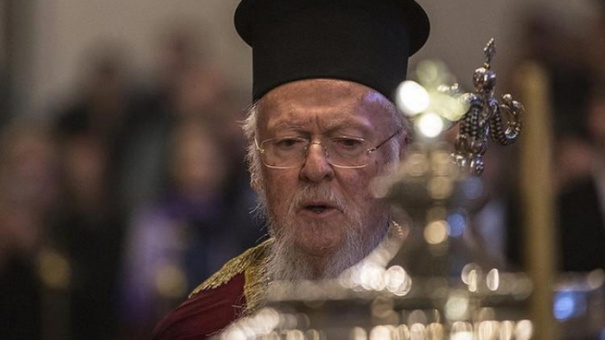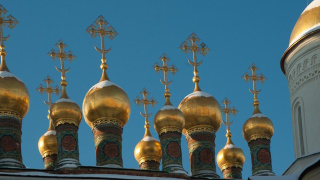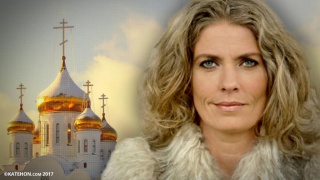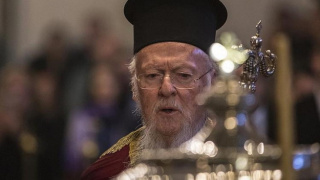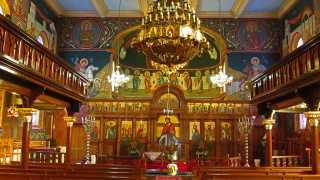The Proper Way to Deprive Bartholomew of Honor
The Proper Way to Deprive Bartholomew of Honor
The easiest question for the ROC Council of Bishops
"In the beginning was the Word ... It was life, and life was the light of men."
This gospel word about Christ is spoken at the Church’s most important service. At the Easter Liturgy.
And with the same word, the Istanbul thief "justified" his dirty deed against the confessor of the 20th century - the Russian Church.
Cathedral of Constantinople versus Istanbul Patriarch
“In the beginning was the Word ... In him was life, and the life was the light of men (John 1: 1,4). The beginning of the Orthodox Church is the Ecumenical Patriarchate, life in it, and this life is the light of the Churches ... Orthodoxy cannot exist without the Ecumenical Patriarchate, ”Bartholomew calculated the“ logical task ”in his speech at the Phanar Council on September 3, 2018, which announced the beginning of the invasion into thw canonical territory of the Russian Orthodox Church.
So, not in Christ is life, not Christ is the Light of the world! But this is the squabbling and swaggering Istanbul Patriarchate.
Heresy, which violates the primacy of Christ in the Church, however, is already known. But in the same speech, Bartholomew repeated more than once that his patriarchal church ... is “Mother of all churches”! "The Ecumenical Patriarchate is responsible for the state of affairs in the church and canonical order, since only it has the canonical privilege ... for the exercise of this supreme and exclusive duty as the guardian Mother and the Head of the churches." Yeah. And also “the common nurse of the Orthodox.”
As usual, the fanatic activist did not bring a single canon in support of his next “canonical privilege”. Because there is no such canon. As far back as 1200, the Patriarch of Constantinople John X wrote to Pope Innocent III: "Neither from the holy apostolic decrees, nor from their canons, do we know any catholic Churches that embrace the rest and are a Mother to others."
The authors of the canons, however, mention the Mother Church in the Epistle of the Second Ecumenical Council to the Roman Church. But “Mother of all churches” is called ... Jerusalem Church. We are talking about the very Second Ecumenical Council, which in its 3rd rule decided: "The Bishop of Constantinople has the advantage of honor over the Roman bishop, because the City is the new Rome." Which once again confirms: even the primacy of honor (not to mention the far-fetched "primacy of power" or - as they say in Vatican - "primate") is evidence of not special merit, but only attachment to the capital of the empire.
And so that there would be no doubt about this conclusion, after 70 years, the IV Ecumenical Council in its 28th rule explained: “The fathers of the throne of ancient Rome respectively were given advantages, since it was a reigning city.”
Istanbul / Constantinople remained the capital of the empire (albeit the Ottoman Empire) until 1922. Therefore, the Patriarch of Constantinople remained the first in honor among the primates of the countries also occupied by the Sunni empire. Here is what the 1848 District Epistle of the Eastern Patriarchs says: “The patriarchs of Alexandria, Antioch and Jerusalem, in the case of unusual and confusing affairs, write to the patriarch of Constantinople because this city is the capital of the autocrats and, moreover, has the advantage provided by the Councils (held in those centuries) when Constantinople was the capital of the Orthodox Empire. - D.S.). If fraternal assistance is corrected in need of correction, then it is good; if not, then the case is referred to the government. But this fraternal assistance in the Christian faith does not happen at the expense of the freedom of the Churches of God. ” Note that the first to sign this message is the Patriarch of Constantinople.
In the same document, the primates of the oldest Antioch, Alexandria, Jerusalem and Constantinople churches recall that the very concept of the primacy of honor appeared as a reference to the capital for the convenience of inter-church relations within the Roman Empire: “Rome was the Concentration of governance and the capital of emperors”, and “every thing, forehead importance, it should have been decided in Rome, especially if one of the disputing parties resorted to outside mediation. " And further, the patriarchs once again explain that "the advantage of fraternal eldership was given to the popes for the sake of the celebrity and antiquity of their City," and not for the sake of "domination and supremacy, which Peter himself never received."
However, if both the ancient canons and the messages of the New Age from the primates of the oldest patriarchates point to the political and administrative background of the primacy of honor, then "the history of the formation of the Local Churches leaves no room for the dogmatization of the advantages of these or other primary departments." This conclusion is made by the doctor of church history, the doctor of church law, a member of the Inter-Council Presence of the Russian Orthodox Church Archpriest Vladislav Tsypin. And indeed, the above rules of Ecumenical Councils have no relation to the creed (stated in dogmas, and not in canons).
Politically driven - historically mutable
“Only those canons that relate to the invariable dogmatic and moral teachings of the Church, and not those that relate to the adaptation of the administrative structure of the Church to changing political conditions, have permanent force,” said the outstanding canonist S.V. Troitsky .. In fact, he repeated the conclusion of the great interpreter of canons - the priest Nicodemus (Milos) that “one ecumenical council can, according to the needs of the Church (emphasized hereinafter by me. - D.S.), modify the rules of another former Cathedral, which do not relate to faith and morality. "
“But if the only reason for the expansion of the rights of the bishop of Constantinople, according to the canons, is the conversion of Constantinople to the capital of the Orthodox empire, then it is clear that with the loss of this position by this City and its transformation into a provincial city of a Muslim state, the canonical basis of the special rights of the Bishop of Constantinople is also lost. For cessante causa cessat effectus ”(with the cessation of the cause, the investigation ceases. - DS), continued prof. Troitsky .. In a polemic with the Ecumenical Patriarchate, juggling the above rules, the professor wrote: “If you give the canons that talk about adapting the church structure to political conditions the same meaning, then we will come to the most absurd conclusions.” And he gave examples of possible absurd conclusions:
- The IV Ecumenical Council did not have the right to subordinate to Constantinople the regions whose autocephaly was previously confirmed by rule 2 of the II Ecumenical Council;
- According to rule VI of the Ecumenical Council, a part of today's canonical territory of the Ecumenical Patriarchate (the continental part of Turkey) should be subordinate to the Cypriot archbishop;
- According to rule I of the Ecumenical Council, the Patriarch of Jerusalem must obey the bishop of Caesarea (today, the suburb of Tel Aviv), etc., etc.
So why does the primacy of the honor of the Istanbul (long time ago Not Constantinople) Patriarch remain unchanged? We find the answer from prof. Tsypin: “Healthy church conservatism is manifested in the fact that the advantages of the department can persist for a long time after the fall of the political significance of the city.” However, how can church conservatism be inherent in those who openly profess heretical modernism?
Neither "honor" nor conscience
“In fact, the notorious“ primacy of honor ”of the Patriarch of Constantinople directly depends on the purity of the Orthodox confession: he declined to heresy - there is no primacy, no honor,” says Bishop Ippolit (Hilko). “Otherwise, the whole Orthodox world had to accept the Ferraro-Florentine Union.” It should be noted that the Patriarch of Constantinople was the only high priest to leave for the Ferraro-Florentine Union. And today's Istanbul patriarch is the only one who openly declares his readiness to recognize the primacy of the Pope.
The bishop of Tulchinsky and Bratslavsky Hippolytus lamented in the early 2000s: "The theological thought of the whole Russian Orthodox Church is silent when the" new old "heresy of papism is affirmed in the Patriarchate of Constantinople." And only in 2019, the experience of the invasion of the new pope on the canonical territory of the Moscow Patriarchate awakened from the blessed sleep “the fullness of the theological thought” of the Russian Church. As a result, the Synod of the Biblical and Theological Commission of the Russian Orthodox Church hinted at Bartholomew unkindly: “Authority is a very fragile status. It is a mistake to believe that it can be imposed or formally assigned to someone. Abuse of trust inevitably leads to the loss of authority, and therefore - the primacy of honor. The actions of the Patriarchate of Constantinople in Ukraine, which cannot be qualified as arbitrariness, undermined the authority of the New Rome department and questioned the legitimacy of naming it as the first among equals. ”
And yet this is nothing more than reasoning.
Such thoughts were shared by another member of the DECR ROC, prof. Troitsky: “The foundation of the high rank of the Patriarch of Constantinople after the fall of Constantinople should not be seen in the canons at all, but in the general agreement of the Orthodox Autocephalous Churches and, mainly, the Slavic, to which the vast majority of the Orthodox world belongs ... and who do not consider it necessary to change the old order, until this does not require the good of the whole Church. ” This was said in the very same year 1947, when the Istanbul Patriarch decided to participate in the constituent congress of an ecumenical gathering called the World Council of Churches. And it was said in preparation for the anti-ecumenical Pan-Orthodox Conference of 1948 in Moscow, in which the Ecumenical Patriarchate, of course, refused to participate.
“If the materials of the Conference were reprinted and formed the basis of church policy, then the“ Bartholomew Church ”would have been dealt a serious blow,”Bishop Hippolytus spoke of this as early as 2001. -
I must honestly admit that the ideas of the Pan-Orthodox Conference of 1948 are not favorable to the supporters of the continued participation of the Russian Orthodox Church in the ecumenical movement, but they do not constitute the majority in it. So where were all our conservatives? There was not even an elementary scientific and theological conference dedicated to the anniversary of the Conference, not to mention more ambitious things. I would like to emphasize that I equally relate all criticism of the real state of affairs in the Church to myself, it has only one goal - as a result of sober introspection, it leads to amove from an unsystematic chaotic defense to a well-organized, strategically verified, ideologically and informationally supported Orthodox counter-attack on " all fronts. ”
21 years passed after the anniversary of the Moscow meeting and went the second year after the invasion of Phanar on the canonical territory of the Moscow Patriarchate. “Even an elementary scientific and theological conference dedicated to the anniversary of the Conference, not to mention an organized, strategically verified, information-backed Orthodox counter-attack by“ all fronts ”” has not been held. We cannot consider the interview of the head of the PR department of the UOC MP V.S. Anisimov (perhaps the only non-conformist in the Kiev Metropolis) as a call to fight: “For a long time it was necessary to put an end to this disgrace. We regard Constantinople as Pharaoh. But there is only a mummy of this Byzantine Pharaoh. ” Although six years ago, in the official document “The position of the Moscow Patriarchate on the issue of primacy in the Ecumenical Church”, the last (at that time) Moscow warning sounded that the “substantive content” of the primacy of honor of the Phanarial department “is determined by the consensus of the Local Orthodox Churches”.
However, in order to reach a consensus, it is necessary at least to initiate a pan-Orthodox conference similar to that which took place in 1948. And in order to have some kind of “meaningful content” to go for it, we should work it out at the Bishops' Council of the Russian Orthodox Church. About which, fortunately, the Patriarch of Moscow has already spoken. And there - we just need to follow the canons, which do not at all consolidate the primacy status of the Department of Constantinople.
